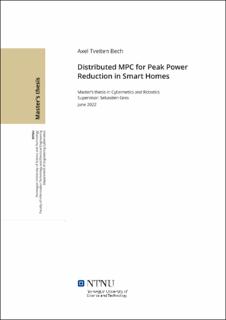Distributed MPC for Peak Power Reduction in Smart Homes
Master thesis
Permanent lenke
https://hdl.handle.net/11250/3020486Utgivelsesdato
2022Metadata
Vis full innførselSamlinger
Sammendrag
I de kommende årene anslås elektrisitetsetterspørselen og andelen ikke-kontrollerbar kraftproduksjon å øke. Forbedret forbrukerfleksibilitet er nødvendig for å imøtekomme økt produksjonsvolatilitet. I Norge i 2022 skal et nytt ‘kapasitetsledd’ erstatte det tidligere fastleddet i nettleia. Dette gir husstander et økonomisk insentiv til å redusere toppstrømbehovet deres. Forskning i modellprediktiv kontroll (MPC) av energibruk i boliger fokuserer i hovedsak på reduksjoner i totalt energibruk og kostnader. Denne oppgaven undersøker modellprediktive kontrollmetoder for å redusere det kombinerte maksimale strømforbruket i grupper av hus ved å kontrollere varmepumpebruken. En distribuert MPC-tilnærming, basert på ‘dual decomposition’, tillater både parallelle utregninger og koordinering mellom hus for å redusere felles effekttopper, samtidig som privatvern og uavhengigheten til hvert hus tas hensyn til. Simulering av kontrollmetodene viser at den distribuerte MPC klarte å redusere momentant og timesmessing toppforbruk, men på bekostning av komforten i husene. Videre forskning bør videreutvikle toppreduksjonsformuleringene, implementere en mer realistisk romtemperaturmodell og undersøke gjennomførbarheten av kombinerte strømavtaler for flere boliger. In the coming years, electricity demand and non-dispatchable power production are projected to increase. Improved consumer flexibility is needed to address the increase in production volatility. A peak power tariff will be introduced for residential electricity consumers in Norway in 2022. This tariff creates an economic incentive for residential consumers to reduce their peak power demand. Research in model predictive control (MPC) methods for residential building power use mostly focus on reductions in total power use and cost. This thesis investigates model predictive control methods for reducing the combined peak power consumption in groups of houses by controlling heat-pump use. A distributed MPC approach, based on dual decomposition, allows for both parallel computation and coordination between houses to reduce joint power peaks while mostly preserving the privacy and independence of each house. Simulation of the control schemes show that the distributed MPC managed to reduce momentary and hourly peak power, but at the expense of comfort in the houses. Further research should refine the peak reduction formulations, implement a more realistic room temperature model, and investigate the feasibility of residential power coalitions.
